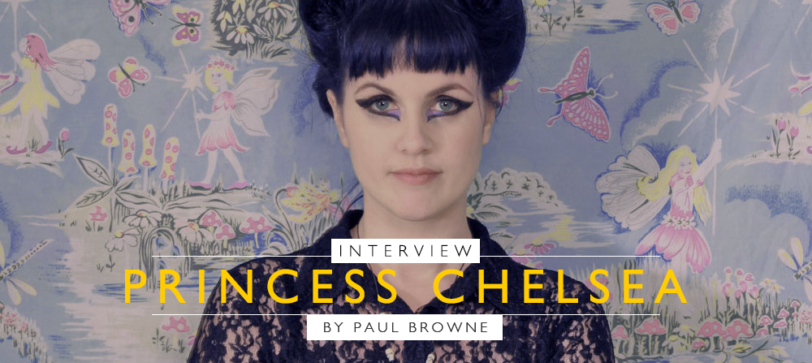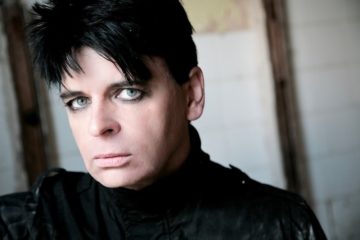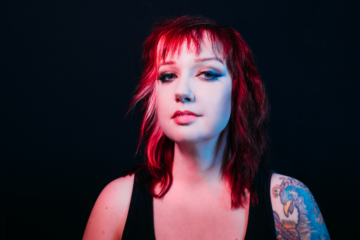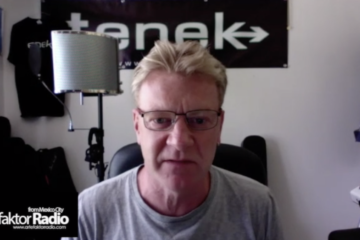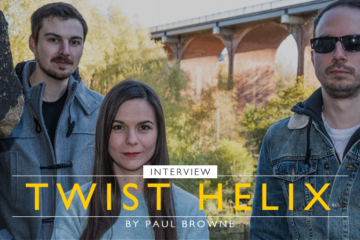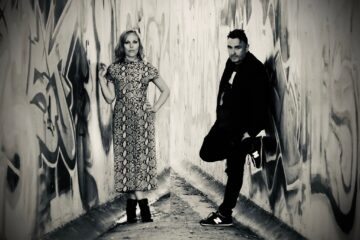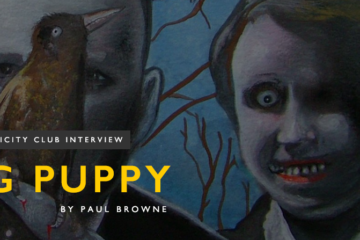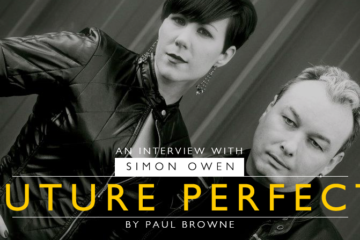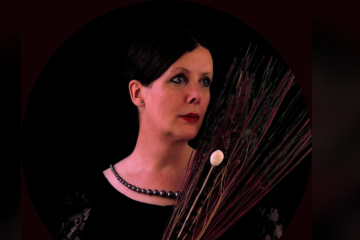Machines Of Loving Grace
One of the surprising musical joys of 2012 was the album Lil’ Golden Book which introduced us to Princess Chelsea (aka Chelsea Nikkel). Hailing from New Zealand, Princess Chelsea comes from the Lil’ Chief stable of artists (that also brought us solo electronic artist Pikachunes) and her delightful collection of wistful electronica made a definite impression. Princess Chelsea enjoyed a high public profile of course due to the stylish melodic workings of single ‘The Cigarette Duet’ and its equally visually memorable video.
The Electricity Club were also in attendance at the Lil’ Chief showcase gig in London earlier this year at which Princess Chelsea wowed the audience with live renditions of the Lil’ Golden Book songs. Prior to the summer, we caught up with Princess Chelsea to chat about her music, her influences and her plans for the future…
Can you talk a little about your musical background prior to Princess Chelsea?
I learned classic piano privately as a child, through my teenage years. I pursued that up until I did all my grades. Then made the decision that I probably didn’t want to become a concert pianist. I learnt a few other instruments – drums and the guitar very briefly and the clarinet. I don’t think I was that good at any of those instruments but it was good to learn them because it helped me later on when I eventually started arranging, writing music for other instruments.
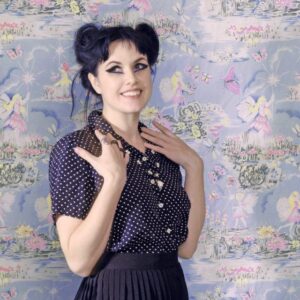
The first band that I was ever in where I wrote music was a punk band called TeenWolf which was in Auckland, New Zealand where I live. I was a teenager still – I was 18 – and it was with a friend of mine. My parents are Jehovah’s Witnesses so when I was a kid I was taken to their church, so I knew this friend from there. It just so happened that it was around this time we left the church and formed a band! (laughs) So it was kind of our way of getting involved in something else other than religion and leaving our old lives behind so that was a very special band for that reason. We never really had any great goals with it. We just got together and it was a very organic process of writing songs in a few hours. Just, I guess, the punk element.
TeenWolf sort of went from 2003 to 2006. Anyway, we got a reputation in Auckland for quite ridiculous live shows, although we never really recorded anything because at that stage we didn’t know how. Digital recording was still developing in the sense that not everyone had access to record cheaply like they do now. So we played a lot of live shows in New Zealand only and it was really great. We were a 3-piece. I played keyboards. People used to describe it as me playing baroque kind of keyboard lines and then it would be juxtaposed with this noisy, horrible guitar! (laughs) and my friend Brad was a frontman who used to scream a lot. People used to compare us a lot with The Pixies but, yeah (laughs) it was a fun band. But then it broke up and I joined The Brunettes, which was a Sub Pop band, with Jonathan who plays guitar in my band and drums and he also runs Lil’ Chief record in New Zealand. So I joined them and I was a member of their touring party, but I wasn’t a creative member of the band so I never wrote anything, I just played live. That was interesting for me to see what it took for a band from New Zealand to get overseas and the realities of being a touring indie musician that’s not quite on the cusp of making it! (laughs) So I was very prepared and had a very realistic view of what that entails. So that’s pretty much my musical history.
Then around that time I started experimenting with production and learning how to record music. When I recorded Lil’ Golden Book it was interesting because the process of recording the album was also the process of me learning how to produce music. Hopefully my next album will be different in the sense that it will be less naïve. I think the naivety of that album is really special, because it’s just all these ideas and things that I was very excited about trying because I was learning how to record them.
Lil’ Golden Book has that interesting idea of combining storybook imagery with the stories of you growing up in New Zealand. Plus the whole album is wrapped up in this storybook cover. Was that a deliberate artistic decision to do that from the beginning?
It was. I think lyrically the way I write is often narrative and I feel in some ways it’s me not wanting to reveal too much about myself, or at least directly to my audience so I find very comfortable telling stories lyrically and I thought that’s how I’d present the album. I very rarely sing from a first person point of view.
I think that’s one of the appeals of the album – a lot of the lyrics are very cryptic. You can almost put your own meanings to the songs.
Yeah, that’s how I felt comfortable doing it. I think my lyrical style will always be like that – quite cryptic – and I’d like to work on perhaps getting a little more personal with it, but I still like to, I guess, make it not too obvious to people because that’s what I think makes the album different.
Were there any bands or artists that had an influence on the album?
I’m very influenced by a lot of music, but as far as the idea of the album and how I was going to present it in the music, I wouldn’t say there was a specific one act that really influenced me. I mean I’m a big Beatles fan and as I was recording the album I was listening to a lot of 70’s prog music! (laughs). It’s funny because a lot of people recently asked me if I’d heard of The Residents and I hadn’t heard of them. But the other day I was looking at clips of them playing live and reading about their music and I was like “Wow! This is amazing!” (laughs) and I can see why people would have thought that I was influenced by them. But I think my main influences came from my classical background and then I’ve got a love of Kraftwerk and electronic music as well as a love of pop music. So just combining those three elements: classical, pop and electronic music I think, was for me, kind of the sound I eventually wanted to achieve which I think some of the later tracks on the album, like ‘Frack’ and ‘Goodnight Little Robot Child’, was the sound I was originally trying to go for, which I’d developed as I recorded. If that makes sense! (laughs)
Can you talk a little about the actual instruments that you use when you’re writing and recording?
Because I’m a keyboardist I’ll generally use a keyboard to start writing a song. Sometimes it’s a synth. I’ve got a really crappy old Roland E20 synth which was one of the first digital synthesisers which has got a lot of ridiculous sounding bells (laughs) and silly orchestral sounds on it that sound quite terrible but I quite like the sound of them. So that was the first keyboard that I ever had and that’s the one I used to play in TeenWolf. So I almost always begin a song using a synth or keyboard. The only one song on the album I didn’t begin with a keyboard was Too Fast To Live which I’d wrote on a guitar, which is very odd for me as I’m not very good with the guitar! (laughs). When I record I record digitally, usually I’ll use a combination of soundbanks or plug-ins on a programme like ProTools and a combination of organic instruments like a piano, glockenspiel and a guitar to map out a song and then I’ll go into a studio afterwards. So it’s like I’m composing as I’m recording with different instruments and then I’ll decide “I think I want some strings here to do this part”, go into a studio later on and get people to record over the top of that original mapped-out song. That’s why the album took so long, because I was continually putting layers and layers and layers and layers (laughs) of all these demos. But the original demos still sound, in some ways, similar to the finished album. It’s just the finished album is a lot richer, a lot more things added to it.
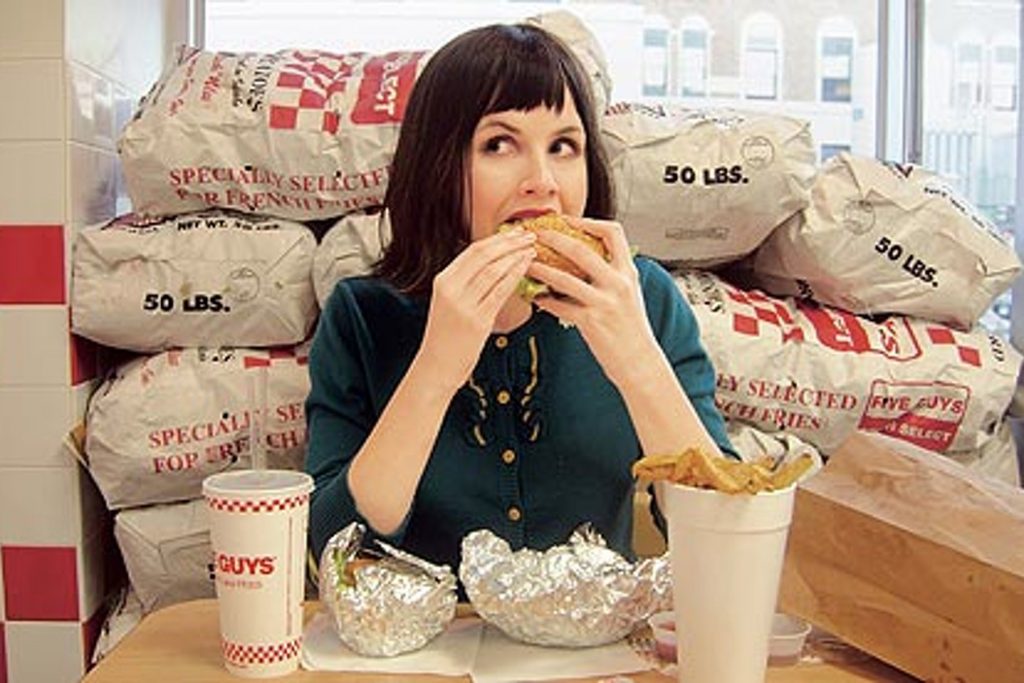
The New Zealand music scene appears to be enjoying a higher global profile. What are your thoughts on the success of New Zealand bands?
Well Lil’ Chief’s quite an interesting label as quite a few of its bands have done that, like The Ruby Suns and The Brunettes, two bands that eventually got a following in North America and signed with Sub Pop – and Lawrence Arabia who’s also on that album, he’s been quite successful in the UK, Europe and North America. But it’s quite hard for New Zealand bands to travel and get their albums distributed, because of the sheer expense of coming over here. And usually someone will not want to distribute you or put your music out over here unless you’ve first made that step to play live and build an audience.
That’s why Lil’ Chief’s quite an interesting label because it seems like the success of some of the earlier flagship artists has been really great for people like me. Because people who like the label and who are fans of it will keep an eye on it and it’s quite a niche label where it’s got a very good reputation for only putting out good albums! (laughs) So chances are if you like one of the albums on the label, at least you won’t hate the other albums on the label! (laughs)
New Zealand’s got a history of putting out interesting music with Flying Nun and the ’80s and ’90s. A lot of people had New Zealand on their radar because of that. I mean it wasn’t a label famed for its electronic music but people think they developed their own sound which they called the Dunedin sound in the 80’s! (laughs) So New Zealand’s kind of quite well respected I think and that actually helps so it helps me and other bands. There’s a sea of Brookland bands and bands from the UK trying to make it, but if you’re from New Zealand I think people are “OK – I might give that a listen”, which is quite good.
Obviously the reactions to ‘The Cigarette Duet’ were quite immense. What were your feelings on that?
It’s quite mixed for me actually. I’m happy and obviously it’s great but it’s very complex because I think it’s a great song and I sort of knew when I wrote it if any of my songs are going to get big, it’s probably this one that’s going to be successful and it has put a lot of people onto my music. But in some ways I think I worry, because we’re in the generation now with the internet and YouTube, people have very short attention spans and I worry that people won’t make that further step to investigate the album, and really understand what the album’s about. Which may be the case for a lot of people that have discovered that track. But then I think at least some of those people will discover that album, so that’s great. Generally I’m happy about it but it brings up some weird insecurities! (laughs)
I discovered ‘The Cigarette Duet’ video first and then checked out the sound samples from the album. It’s always the way where you listen to one track and you think it’s good, but then you wonder if the rest of the album is going to match up to that. I was really pleasantly surprised that the rest of the tracks from the album were just as good.
Well yeah I made a point of only putting like 10 or 11 really great songs on it because I didn’t want there to be filler on the album. It’s funny because ‘The Cigarette Duet’ is great but I wouldn’t say it’s indicative of necessarily the rest of the album at all. It’s almost like a wild card.
It’s almost got a very different sound to the rest of the album.
Yeah and some people think Princess Chelsea is a male/female duo because they’ve watched the YouTube clip and they’re like “Oh yeah this is pretty cool. They do ’60s pop” and I’m like “kind of, but not really!” (laughs). It’s sort of like a fun song in the middle of the album.
Have you seen all of the cover versions on YouTube?
Yeah! (laughs) I haven’t seen all of them, but every now and then someone will post one on my Facebook page. There’s some weird ones….
How many takes did you do of ‘The Cigarette Duet’ video in the end?
So many. It was at my parent’s house and we did a day of takes, so maybe about 20. And then I decided that I didn’t like my hair after watching it! (laughs). I’m not usually that vain, but I guess I was having a diva moment that day. So we did another day of takes with the pink wig on. Yeah, I think maybe 50 takes or so? So the deadpan, bored expressions by the end are so honest! (laughs)
What was the weather like when you were doing the video?
New Zealand’s got very mild weather. It’s never too cold or hot. It was one of those weird in-between days where it was kind of sunny but cold and it rained a bit as well. But it’s a great video and I wasn’t expecting it to do as well as it did because it’s quite budget. It didn’t cost anything to make.
The other videos are of course interesting in their own ways because they’re also quite odd, particularly ‘Ice Reign’ because it features you looking at a computer for pretty much the duration of the video. So you seem to like these long static shots.
Yeah I really like the long static shots. I think I need to move away from them a little because I think I’ve done that. But I like someone intently observing someone and then just watching the weird quirks of what they’re doing. I think around the time I made the album I went and saw Dean and Britta from Galaxie 500 play and they did the music for the 13… [13 Most Beautiful Women & 13 Most Beautiful Boys – Warhol’s Screen Test series of films] Andy Warhol basically filmed people statically. And I’d been watching heaps of those. Actually the ‘Ice Reign’ shoot I thought I want to do a really static video, because it was the first one I’d made. And then Lou Reed in one of the videos was drinking Coke and I thought it would be funny to reference that. Then I decided to incorporate the internet and the idea of staring at a computer to make it more modern, because the album has got themes of the internet and stuff running through it.
I thought the theme of ‘Ice Reign’ was getting caught up in arguments and debates online.
Yeah that’s exactly what it’s about! (laughs)
Yet it’s still quite cryptic that you’re not sure what it’s about. It is my favourite track from the album
Oh great. That was a very early one that I wrote. It was actually the first recording that I did.
You seem to steer clear of that traditional verse, chorus, middle eight construction. You also seem fond of very long intros as well. Was this a conscious decision to write songs in this way?
I guess. For instance there’s one traditional song on the album and that would be ‘Too Fast To Live’, which is a very traditional verse, chorus, middle eight – and that was the one song I wrote on a guitar. It was pretty much mapped out before I started recording it.
Whereas nearly all of the other songs on the album were almost experiments in recording. So that would certainly be why intros are very long because I’m sort of creating a sound as I record. I never really have any strict plan as to how I write and I’m quite happy to write verse, chorus, middle eight songs if it’s what comes to me, but I don’t like to have any rules I guess. But then again I’m not purposely breaking them either.
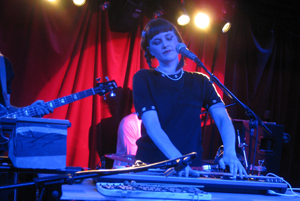
Was it difficult to adapt the songs to a live setting?
Yeah it was. I actually started rehearsing a band about two years ago and originally we had eight members, because we can with the songs, there’s so many parts to them and that proved to be too much work. We played one show and I really wasn’t happy with it because I didn’t feel like the band had good chemistry. After that I dropped it down to a 2-piece with backing tracks, which was me and Jamie Lee – the other girl that plays keyboards. We did a few shows like that and it felt OK, but then I didn’t like it because I felt it lacked the energy of a proper live band. So then we added Jonathan and played as a 3-piece for a while, he used to play exclusively drums, and it was getting there but it still wasn’t quite there and that’s when I decided I wanted to get rid of backing tracks and just play everything live. So in order to do that I jumped it up to a 4-piece again but I’m quite happy with the 4-piece now because we’re all very, very good friends and there’s a good chemistry between all four members. It doesn’t feel like we’re interpreting songs anymore. It feels like a band live to me. Because we had to work out for so many years how we’re going to interpret these songs, these songs have become everybody’s songs as opposed to me feeling like I’m playing with some hired guns.
I did notice that there did seem to be very good chemistry on stage. I was also intrigued by the way some members could easily switch between instruments for different songs.
Yeah the changing instruments, that kind of happened because Jonathan originally played drums for all the songs and then he moved onto the guitar. I mean it’s been something that The Brunettes used to do a lot actually, which was the band I used to play in. The choice for me was I could have six members in my band and for half the songs they’d be doing very little, except maybe playing some percussion. Or I could have four members and we could change around a lot. I feel like changing instruments is really great because if I move onto the bass guitar for a song it gives it a whole different energy, which is quite a break I think from me standing in front of the keyboards the whole time. I used to play the drums in a song as well but I stopped because I felt I wasn’t a very good drummer! (laughs)
What sort of keyboards do you use on stage?
The keyboards that we’re using at the moment, essentially are just MIDI controllers so they’re M-Audio Keyrig keyboards and they used to run off ProTools but now they run off a programme called Main Stage where basically we get soundbanks from all over the place. The most common one I use is an FM8 plug-in which basically emulates a Yamaha DX7 synth, but for us to travel with those extra synths would be unfortunately too difficult because they’re kind of unreliable and they’re very heavy and bulky. So instead of doing that we basically have the memory that those synths would use loaded up in a programme and then it’s triggered by these keyboards, essentially just controllers. But yeah a lot of my sounds are from a Yamaha DX7. I’ve got one back home but it breaks a lot so I can’t use it live unfortunately! (laughs).

What are your plans for the future? When can we expect to see the follow-up to Lil’ Golden Book?
I’m going home in July to record and I’m trying to finish recording by the end of the year. And some of my plans are to release an album early next year, probably in the States, Europe and the UK in March. That’s the plan anyway. So, as long as I work hard and write a good album, because I’m not going to put out a shit album! (laughs) then that’s what’s going to happen! I’ve been recording a lot of covers and I’ve got about seven that I’ve recorded in the last 6 to 8 months.
Any particular titles you can mention?
I did a cover of a band called Craft Spells which I actually put up for free download. They’re a synth-pop band from California. I did a cover of a black metal band called Dark Throne, but I did it in an orchestral style. I’m doing a Kinks cover, a song called ‘I Go To Sleep’. I’ve done a Beatles cover and I’ve down a ‘White Town’ cover already.
The ‘White Town’ cover was a nice surprise in the live setlist
I just think it’s a really great song and I’ve always wanted to cover it. So I recorded a cover of it about 3 years ago. I’m not too fussed on the recording anymore. In some ways I’d like to re-record it. I think I won’t, I think I’ll just move on and I prefer playing it live now. I think it’s, as you say, interesting but people tend to like it.
The arrangement’s quite unusual compared to the original song
It’s very different but I think it highlights the strengths of the song as well. I prefer the original! (laughs) I think it’s important when you do a cover to put a different spin on it, but in a way that showcases how great the original is.
Do you listen to a lot of contemporary electropop artists?
To be honest I haven’t been listening to music for a couple of years! (laughs) I tend to listen to a lot of older electronic music like Jean-Michel Jarre, Kraftwerk. I don’t know a lot of obscure electronic artists, but I tend to listen to very obvious stuff which I enjoy. Very simplistic electronic music.
Are there any particular Kraftwerk songs or albums that stand out for you?
I like ‘Trans Europe Express’ a lot. I kind of like all of them but I think it’s my favourite. I’m not sure what changes for me. I’m a fan of a lot of ’70s music, bands similar to Pink Floyd where they used electronic music and they mixed it with pop music. I love Air because I feel they make some of the most beautiful music I’ve ever heard and it’s largely electronic. The album Talkie Walkie by Air is probably my favourite album I think.
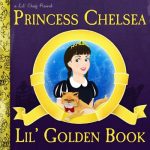
The Electricity Club gives its grateful thanks to Chelsa Nikkel
Lil’ Golden Book is out now on Lil’ Chief Records.
http://princesschelsea.lilchiefrecords.com/
facebook.com/wonderfulprincesschelsea
twitter.com/#!/lilgoldenbook
soundcloud.com/princesschelsea
http://www.myspace.com/wonderfulprincesschelsea


